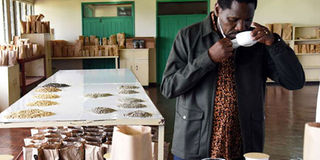Munya leaves maize farmers out in the cold

Agriculture Cabinet Secretary Peter Munya tours Dandora Coffee Plantation in Nairobi on April 3, 2020. PHOTO | EVANS HABIL | NATION MEDIA GROUP
What you need to know:
- Fear of the novel coronavirus pandemic that continues to spread and disrupt markets and food systems across the world has led to panic-buying.
- A number of businesses have at the same time taken advantage of the prevailing situation to hoard goods, anticipating the prices to shoot up.
Agriculture Cabinet Secretary Peter Munya on Friday said the government does not intend to buy maize from local farmers.
The country faces a food crisis as the locally available maize can only last up to next month, he said.
The government has in the past been instrumental in buying grain from local growers through the National Cereals and Produce Board (NCPB), but the buying was marred by runaway corruption.
During a tour of a coffee-processing plant in Dandora, Mr Munya said the government had withdrawn from the business of buying or importing grains and would only focus on creating a conducive business environment for processors and private organisations.
Two days ago, he allowed processors to import four million bags of maize to beat the looming deficit.
The imported grain — two million bags of white and another two million of yellow maize — will attract 14 per cent and 10 per cent excise duty to maintain fair competition, he said.
“Our work is to come with policies to support the private sector. We arrived at the four million bags by looking at the shortfall,” the minister added.
ROGUE TRADERS
He told farmers and traders hoarding their produce expecting to sell it to the government to “forget it” and release the maize to the market.
The imports are expected to serve the country between May and July when the first harvest season begins.
Fear of the novel coronavirus pandemic that continues to spread and disrupt markets and food systems across the world has led to panic-buying.
A number of businesses have at the same time taken advantage of the prevailing situation to hoard goods, anticipating the prices to shoot up.
Mr Munya said the government would arrest and prosecute such traders. Some top government officials have even said the prices of basic food commodities may be controlled should businesses take advantage of the current situation to exploit poor Kenyans.
“We have not reached there yet, but businesspeople should stay warned that we will not hesitate to invoke the Price Control (essential goods) Act to protect the public,” Mr Munya said.
MORIBUND INDUSTRY
The Act allows the National Treasury to set maximum prices for gazetted essential commodities upon consulting the relevant industry.
The Cabinet secretary also said the country is on track in reviving the coffee industry.
He said the Kenya Planters Cooperative Union that is charged with milling and marketing coffee cherry is being revived.
The government has set aside Sh1.5 billion for the revival of the sector. “The money will be used to turn the sector around, digitise the coffee industry and refurbish the processing structure by the end of the month,” Mr Munya added.





